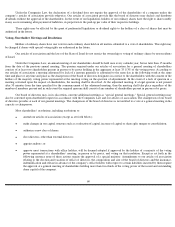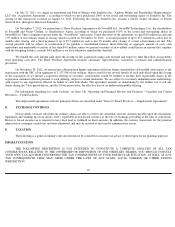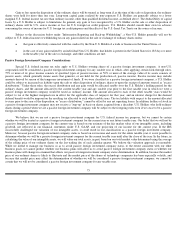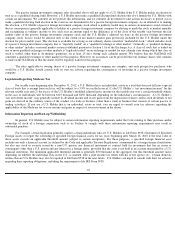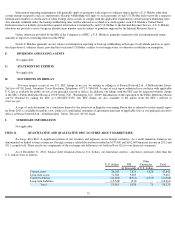Incredimail 2012 Annual Report Download - page 75
Download and view the complete annual report
Please find page 75 of the 2012 Incredimail annual report below. You can navigate through the pages in the report by either clicking on the pages listed below, or by using the keyword search tool below to find specific information within the annual report.
The following is a summary of the material Israeli tax laws applicable to us, and some Israeli Government programs benefiting us. This
section also contains a discussion of some Israeli tax consequences to persons acquiring our ordinary shares. This summary does not discuss all
the acts of Israeli tax law that may be relevant to a particular investor in light of his or her personal investment circumstances or to some types of
investors subject to special treatment under Israeli law. Examples of this kind of investor include residents of Israel or traders in securities who
are subject to special tax regimes not covered in this discussion. Since some parts of this discussion are based on new tax legislation that has not
yet been subject to judicial or administrative interpretation, we cannot assure you that the appropriate tax authorities or the courts will accept the
views expressed in this discussion.
The discussion below should not be construed as legal or professional tax advice and does not cover all possible tax considerations.
Potential investors are urged to consult their own tax advisors as to the Israeli or other tax consequences of the purchase, ownership and
disposition of our ordinary shares, including, in particular, the effect of any foreign, state or local taxes.
General Corporate Tax Structure in Israel
On December 5, 2011, the Israeli Parliament (the Knesset) passed the Law for Tax Burden Reform (Legislative Amendments), 2011 ("the
Tax Burden Law") which, among others, canceled effective from 2012, the scheduled progressive reduction in the corporate tax rate. The Law
also increased the corporate tax rate to 25% in 2012. Following the amendment, corporate tax rates and capital gains rates are: 2011- 24%, 2012-
and thereafter-
25%. However, the effective tax rate payable by a company that derives income from an Approved, Beneficiary or Preferred
enterprise (as discussed below) may be considerably less.
Foreign Exchange Regulations
Under the Foreign Exchange Regulations the Israeli company is calculating its tax liability in U.S. dollars according to certain orders. The
tax liability, as calculated in U.S. dollars is translated into NIS according to the exchange rate as of December 31st of each year.
Law for the Encouragement of Capital Investments, 1959
The Law for Encouragement of Capital Investments, 1959 (the "Investment Law") provides that capital investments in a production
facility (or other eligible assets) may, upon approval by the Investment Center of the Israel Ministry of Industry and Trade (the "Investment
Center"), be designated as an Approved Enterprise. Each certificate of approval for an Approved Enterprise relates to a specific investment
program, delineated both by the financial scope of the investment and by the physical characteristics of the facility or the asset. The tax benefits
from any certificate of approval relate only to taxable income derived from growth in manufacturing revenues attributable to the specific
Approved Enterprise. If a company has more than one approval or only a portion of its capital investments are approved, its effective tax rate is
the result of a weighted combination of the applicable rates. The tax benefits under the law are not available for income derived from products
manufactured outside of Israel.
The benefits available to an Approved Enterprise are conditioned upon terms stipulated in the Investment Law and the regulations
thereunder and the criteria set forth in the applicable certificate of approval. If we do not fulfill these conditions in whole or in part, the benefits
can be canceled and we may be required to refund the amount of the benefits, with the addition of the Israeli consumer price index linkage
differences and interest. We believe that our Approved Enterprises were and continue to be operated in compliance with all applicable conditions
and criteria, but there can be no assurance that they will continue to do so.
The Investment Law also provides that an Approved Enterprise is entitled to accelerated depreciation on its property and equipment that
are included in an approved investment program.
Tax benefits under the 2005 Amendment
The Amendment to the Investment Law, effective as of April 1, 2005 has significantly changed the provisions of the Investment Law.
An eligible investment program under the amendment will qualify for benefits as a “Beneficiary Enterprise” (
rather than the previous
terminology of Approved Enterprise). Among other things, the amendment provides for tax benefits to both local and foreign investors and
simplifies the approval process.
66





